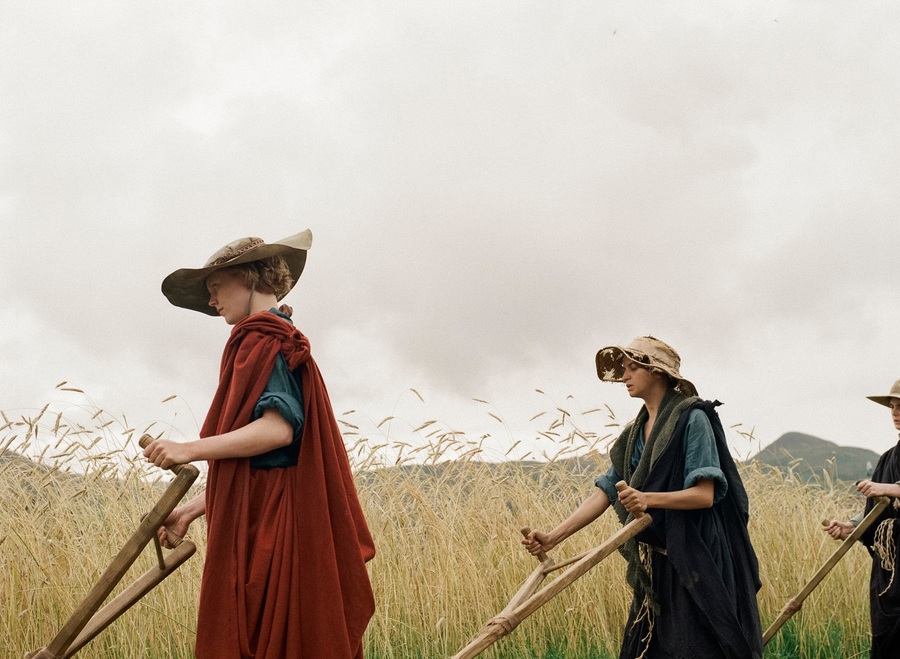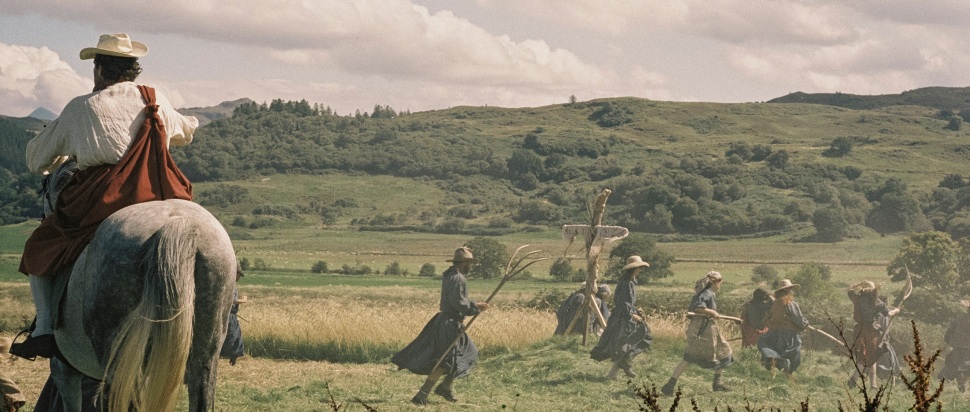Athina Rachel Tsangari on Harvest
Athina Rachel Tsangari swaps the 'Greek Weird Wave' for the Scottish Highlands with her elegiac period drama Harvest. Tsangari talks to us about the film's Marmite reactions, its doom-laden atmosphere and her fondness for ambiguous characters
The location of an in-person interview can inform both the mood and the questions raised. Back at the Glasgow Film Festival in March this year, I'm set to speak to Greek director Athina Rachel Tsangari (Attenberg; Chevalier) about her newest feature, Harvest, an adaptation of Jim Crace's Booker Prize-nominated novel, which transports the book's English village setting to Scotland during the Middle Ages. In preparing my questions, I have a look at some things Tsangari said about the film around the time of its world premiere in Venice a few months earlier. Speaking to Savina Petkova at Cineuropa, Tsangari, discussing the range of idioms and accents in her Scotland-shot film, said with a laugh, "I think we're going to be crucified by the Scots and the Brits."
No better place to follow up on that topic than in Glasgow, where we meet on the day of the film's Scottish premiere. I begin, as the very first question, with that elephant in the room: since she thought she'd "be crucified", now that Harvest has screened at the London Film Festival and in Glasgow, how has she found the UK responses to the film? Her answer to this opener: "I mean, we got one star from The Guardian, from Peter Bradshaw. So, I call this crucifying. Ouch." Cue the Curb Your Enthusiasm theme playing in my head.
Harvest has proven divisive on the festival circuit, and Peter Bradshaw's pan was apparently the very first review the film's team read after their world premiere. But Tsangari seems relaxed and appreciative about her latest movie's Marmite qualities. "The screening at the London Film Festival in the Royal Festival Hall felt amazing," she tells me. "The audience was very welcoming. But, you know, this is not an orthodox period film."
As mentioned, Harvest takes place sometime in the Middle Ages, but part of the allegorical film's eerie intrigue stems from the fact that the era in which it's set is undefined by design. Over the course of seven hallucinatory days, the residents of an unnamed Scottish village see their traditional way of life disrupted by economic turmoil and the arrival of outside forces. The ostensible leads are Walter (Caleb Landry Jones), a soulful farmer, and Master Kent (Harry Melling), the befuddled lord of the manor. The former is often found wandering lost through the movie's strange, folk horror-tinged events, trying to make sense of the madness taking over this place; madness for which people are seeking a scapegoat. Rosy McEwen, Arinzé Kene, Thalissa Teixeira, Neil Leiper and Frank Dillane round out the main ensemble.

"Jim Crace's [novel] is a radical, punk book that doesn't follow any prescriptive recipes about the period it's taking place in," Tsangari tells me of the atmosphere. "It's quite fluid with space and time. So whether [Harvest] is about the enclosure act, the [Highland] clearances or whether it's set today… it was not the point to be precise historically. I wasn't really giving a damn about that. It was the opposite, actually, because I felt that doing something where you couldn't quite place yourself made [things] stronger for the story's relevance. It basically has never stopped happening around us." The "it" being social upheaval through rampant capitalism.
Throughout Harvest, there's little in the way of black-and-white characterisation, with even the more outwardly antagonistic players – such as Dillane's Master Jordan, who arrives at roughly the halfway point – having pretty understandable logic behind their actions. "This is what attracted me to the original novel," Tsangari says. "And in general, that's how I usually approach my characters, with a lack of judgement. I resist, with all my might, making ethical pronouncements or moral judgements. I leave this to the audience, who are extremely smart, don't need their hands held and can definitely read between the lines.
"For example, Master Jordan, in a more traditional western, he would be the villain, right? But he’s actually an idealist. He's a romantic in his own way. He's a young, educated guy, an economist, who wants a better future for himself and for the land. The village was fucked anyway. The yield was not good enough. The moral dilemma that Jim [Crace] put forward is that something was [always] going to break. The question is how? And how do we approach the invasion of a new force? How do we resist? Do we adapt? Do we flee?"
Speaking of westerns, Bosch, Rembrandt and "anti-westerns of the 70s" were apparently among the visual references for the 16mm cinematography by "master of natural light" Sean Price Williams. "Whether it was Czech cinema, [Akira] Kurosawa or [Robert] Altman," Tsangari says, "it was this gritty, chaotic language of nihilist westerns. Hallucinatory nihilism." The result is one of the most visually striking films shot in Scotland in recent memory.
Filmography: Harvest (2024), Chevalier (2015), Attenberg (2010), The Slow Business of Going (2000)
Harvest is released 18 Jul by MUBI
